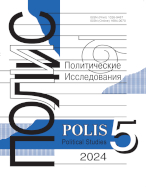Effects of the “Maidan”:
Political System of Ukraine after the Crisis of 2004
DOI: 10.17976/jpps/2005.01.06
Kynev A.V. Effects of the “Maidan”: Political System of Ukraine after the Crisis of 2004 . – Polis. Political Studies. 2005. No. 1. https://doi.org/10.17976/jpps/2005.01.06
The article tackles the analysis of the constitutional process in Ukraine and of eventual political consequences of the reform of December 8, 2004. The author demonstrates that although Ukraine has taken a step from post-Soviet autocracy toward parliamentarism, she is still in the very beginning of the way to real democracy. According to his conclusion, the new system of state power organization in Ukraine is as alienated from the interests of the common elector, as the Kuchma system. While being meant to put an end to the “strange” system that existed in the country, with a strong president, an “irresponsible” Rada and a helpless government, the reform, on account of democratization and of consolidation of the division of powers, in fact hardens the clanship character of Ukrainian politics. In the author’s estimation, the prime minister, after he becomes free from the president’s dictates, yet, will not be able to tread an independent course, since the members of his cabinet will be directly subordinate to the clans-parties that will have nominated them.
See also:
Fyodorov K.G.,
The Policy in the Sphere of Local Taxation in Russia. – Polis. Political Studies. 2003. No4
Peregudov S.P.,
Transnational Corporations on the Way to Corporate Citizenship. – Polis. Political Studies. 2004. No3
Peregudov S.P.,
Corporate Capital and Power Institutions: Who Plays the Master?. – Polis. Political Studies. 2002. No5
Kazantzev A.A.,
Intelligentsia and Structural Innovations in Political Expanse (An Essay of Comparative Analysis). – Polis. Political Studies. 2007. No1
Sergeev V.M.,
How Are Social Changes Possible? (Prolegomena to a Statistical Theory of Social Networks). – Polis. Political Studies. 2001. No6





.jpg)






 print
print
.jpg)
.jpg)